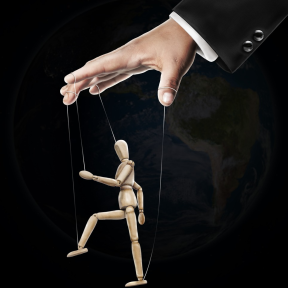
Love Bombing
The term “love bombing” refers to a pattern of overly affectionate behavior that typically occurs at the beginning of a relationship, often a romantic one, in which one party “bombs” the other with over-the-top displays of adoration and attention. This behavior can include showering the other person with gifts and/or compliments, declaring love early on, and/or taking steps to remain in constant contact and spend increasing amounts of time together.
Love bombing is considered a deliberate and manipulative tactic that is deployed in order to gain the upper hand over a new partner and increase his or her dependence on the bomber. Because of this, it is often attributed to individuals who are high in narcissism or other antisocial traits or those who engage in domestic violence; it has also been frequently used in reference to cults. However, it is possible for someone to engage in similar behaviors without necessarily having ill intentions.
The concept of love bombing has gained cultural prominence in recent years; however, little peer-reviewed research exists on the phenomenon specifically.

Common signs that someone is love bombing another person may include:
- Gives numerous and/or extravagant gifts, particularly early in a relationship
- Excessive and/or exaggerated flattery
- Early, frequent, and/or extreme declarations of love and affection (for example, saying “I love you,” “You’re my soul mate,” or “You’re everything I’m looking for” on a first date)
- Attempts to be in constant contact—for example, bombarding the other person with nonstop texts or phone calls
- Seeks quick commitment; in a romantic relationship, for example, brings up things like marriage or moving in together right away
- Displays emotional neediness and reactivity; may become upset if the other person has other plans or doesn’t answer a communication right away
- Ignores attempts by the other person to set boundaries
Love bombing tactics are intended to overwhelm the target and make them feel as if they’ve found a true connection. Many love bombers intend for their target to spend increasingly less time with friends and family in favor of spending time with the perpetrator.
But after an early period of affection and attention (often referred to as idealization), love bombers will typically start to engage in more openly aggressive and harmful tactics—such as withdrawing affection when angry, insulting the other person, attempting to control their appearance or behavior, berating them for small mistakes, or even engaging in physical abuse. This period is often referred to as devaluation. Cycling between periods of idealization and devaluation is common; indeed, returning to overly affectionate behavior can be a way for the perpetrator to “make up for” the abuse that occurred during the devaluating phase and keep the other person invested in the relationship in spite of its obvious problems.
What exactly constitutes love bombing has not been extensively studied, and it can at times be difficult to tell whether a “love bomber” is engaging in deliberately manipulative behavior. Other explanations for overly affectionate behavior patterns—such as genuine adoration, social awkwardness, or mere naivete—also exist.
Many people are theoretically capable of engaging in love bombing behaviors. However, the tactics are most often thought to be the purview of those with high levels of trait narcissism or diagnosable narcissistic personality disorder, who tend to be low in empathy and frequently attempt to manipulate those around them. Love bombing, or a variation of it, is also thought to be a common tactic of sex traffickers, gang members, and cults.
There is no set amount of time that love bombing will last. However, the onset of affection will typically be extremely rapid and the behaviors may switch from idealization to devaluation in a few weeks or less.
Yes. Love bombing is most often discussed in the context of romantic relationships; however, it is also possible for someone to engage in similar behaviors when meeting a new platonic friend.
The term "love bombing" has been used to denote a very different—and positive—tactic on the part of a parent. While colloquial love bombing is considered a negative behavioral pattern that unfolds between adults, some psychologists use it to describe an effective parenting technique. Love bombing, in this sense, refers to parents spending large amounts of time with their children and showering them with undivided attention and unconditional affection. Doing so, these experts suggest, can help children deal with stress or manage behavioral problems such as tantrums or defiance. It should be noted that the term love bombing is only rarely used in this context.
The term “love bombing” in itself refers to a pattern of behavior that is considered manipulative and intentional. Yet some people engage in overly affectionate behavior for reasons that are not so nefarious. For example, someone who fears abandonment may shower a new partner with gifts in an attempt to avoid losing them, while someone who frequently compliments or expresses fondness for a new friend may come from a culture or family where such expressiveness was the norm. It’s also possible, of course, for two people to feel a quick connection and choose to become romantically committed or highly affectionate with each other right away. When assessing whether someone is engaging in love bombing, it can help to consider their possible motives, or even talk to them about any disquieting behavior, before jumping to conclusions.
The term “future faking” refers to a manipulative courtship strategy in which someone draws in a potential partner by extensively detailing their imagined future together; however, this future is unlikely to happen. For example, someone engaging in future faking may woo a first date by talking about the vacations the couple will soon go on, the house they’ll one day buy, or even how many children they’ll have—all while sounding very enthusiastic and sincere. Once the relationship is established, however, these grand plans are forgotten; the future faker may become distant and cruel at this stage. Future faking is thought to frequently occur in the context of love bombing and is also considered a common tactic of people who are high in narcissism.

Feeling that one is or has been the victim of a love bomber can be painful. Such relationships may end in the love bomber “discarding” the other party, some psychologists suggest, usually when they determine that the relationship no longer meets their needs. Alternatively, the other party may decide to extricate themselves from the relationship, which can be both emotionally and practically challenging. Some report that after their “whirlwind” relationship ended, they found it harder to trust new people; in more extreme cases, especially those that involve physical or emotional abuse, the individual may feel as if they lost their identity. Taking steps to rebuild one’s sense of self, reconnect with family and friends, and learn to trust again—often with the help of a therapist—can help someone move past their negative relationship after being love bombed.
Genuine affection is mutual and should unfold at a pace that is comfortable for both parties. Love bombing, by contrast, tends to feel one-sided—with one partner showering the other with gifts, praise, and declarations of love—and moves at a pace where one partner feels overwhelmed or as if they’re caught up in a whirlwind. Someone repeatedly crossing stated boundaries—even if they claim to have positive motives for doing so—may also be an indicator of manipulative intentions. Similarly, while it’s normal for new partners to spend a lot of time together, feeling isolated from one’s family and friends because one is spending all their time with a new love interest may suggest that the relationship is falling into unhealthy patterns.
To recover from being love bombed, experts usually suggest that the victim cut off contact with the offending person; often, maintaining connection after a breakup can lead to the idealization-devaluation cycle starting again. It’s also important to reconnect with family and friends, as well as reengage with interests that may have fallen by the wayside during the relationship, in order to rebuild one's independence and sense of self. Seeing a therapist can also help someone cope with feelings of worthlessness or distrust that arise as a result of the relationship.














